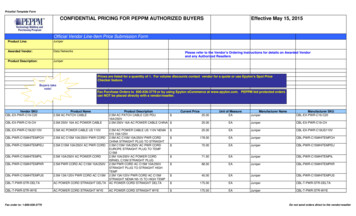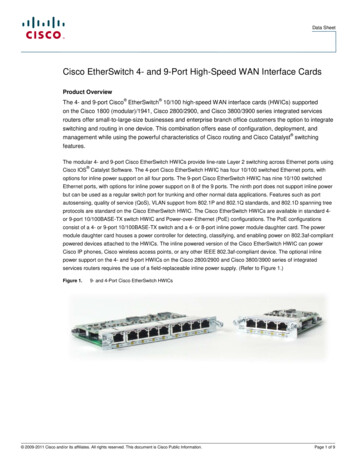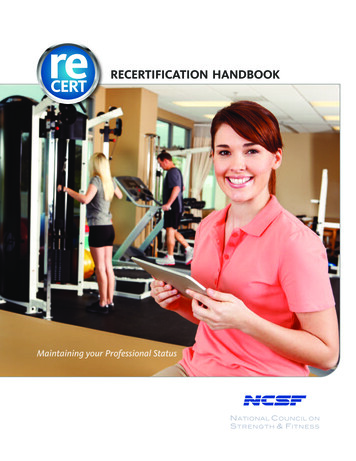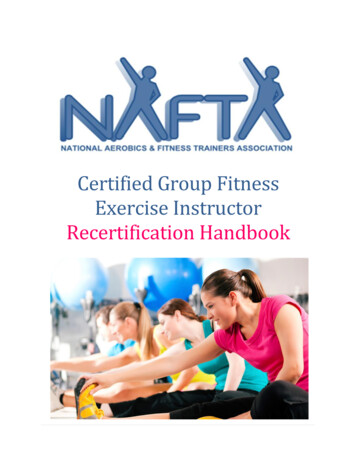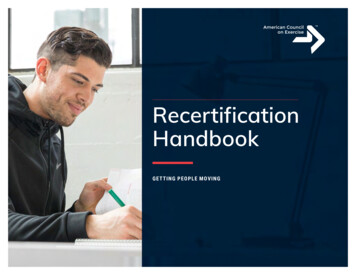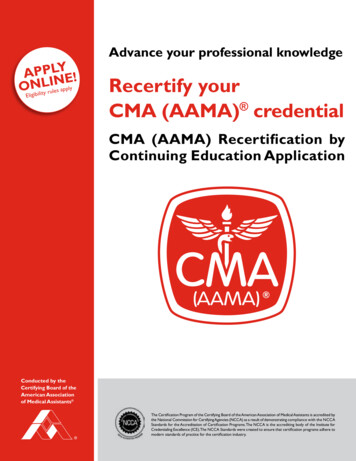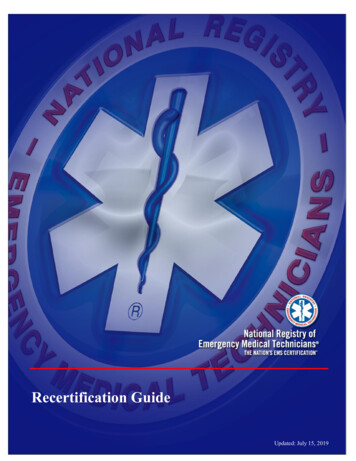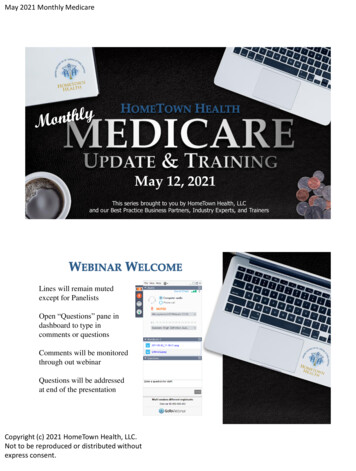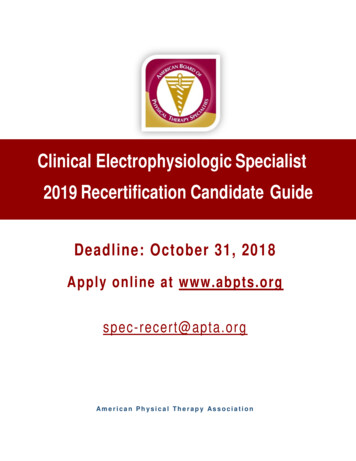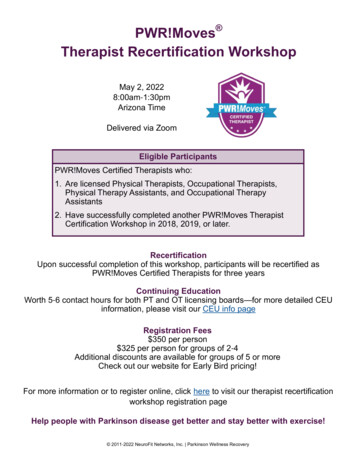
Transcription
PWR!Moves Therapist Recertification WorkshopMay 2, 20228:00am-1:30pmArizona TimeDelivered via ZoomEligible ParticipantsPWR!Moves Certified Therapists who:1. Are licensed Physical Therapists, Occupational Therapists,Physical Therapy Assistants, and Occupational TherapyAssistants2. Have successfully completed another PWR!Moves TherapistCertification Workshop in 2018, 2019, or later.RecertificationUpon successful completion of this workshop, participants will be recertified asPWR!Moves Certified Therapists for three yearsContinuing EducationWorth 5-6 contact hours for both PT and OT licensing boards—for more detailed CEUinformation, please visit our CEU info pageRegistration Fees 350 per person 325 per person for groups of 2-4Additional discounts are available for groups of 5 or moreCheck out our website for Early Bird pricing!For more information or to register online, click here to visit our therapist recertificationworkshop registration pageHelp people with Parkinson disease get better and stay better with exercise! 2011-2022 NeuroFit Networks, Inc. Parkinson Wellness Recovery
Course DescriptionThe PWR!Moves Therapist Recertification Workshop will introduce participants to a new frameworkfor implementing the PWR!Moves as the foundation to “Rebuild Functional Mobility” in persons withParkinson disease (PD) as a lifelong model of care. Participants will first review and practice theBasic 4 PWR!Moves as the building blocks of PD-specific functional skill training and will thenintegrate those skills into familiar sequences for mobility and functionality. Participants will applyclinical reasoning skills and neuroplasticity principles to systematically progress motor and cognitivechallenges to skillfully implement specificity of practice for treating individuals with varying symptomsand varying functional and exercise goals. Live demonstrations, videos, and interactive instruction willbe used to illustrate, rehearse, and discuss the implementation of this framework for the retraining offunctional mobility goals, as well as its integration into community exercise programs as a means ofpracticing skills learned in therapy and sustaining the benefits gained in rehabilitation.Upon successful completion of this workshop, participants will be recertified as PWR!Moves CertifiedTherapists for three years.Objectives and GoalsUpon successful completion of this workshop, participants will be able to:1. Describe and explain how PWR!Moves provide the foundation to “Retrain and SustainFunctional Mobility” in both rehabilitation and community exercise settings.2. Teach the PWR!Moves in 5 basic positions: prone, supine, all 4’s, sitting, and standing.3. Use new advanced positions to progressively challenge physical effort and cognitiveengagement.4. Implement modifications, such as adaptations, cueing, and feedback, to PWR!Movesinstruction to optimize quality of movement and success.5. Personalize the implementation of PWR!Moves to differentially target specific PD symptomsand functional mobility goals.6. Demonstrate proficient use of task-analysis to deconstruct and rebuild function for a commonrehabilitation goal.7. Provide examples of techniques used to progress complexity of practice that exploit goaldirected and habitual behaviors.8. Effectively use PWR!Moves Boosts as a stand-alone tool or as a component integrated withother PWR!Moves exercises.22 2011-2022 NeuroFit Networks, Inc. Parkinson Wellness Recoverywww.pwr4life.org
PWR!Moves Therapist Recertification WorkshopMy TimeAZ TimeTopic7:30 amRegistration8:00 amRetrain Functional Mobility—Group Practicum Level 1— Deconstructing Function Review Basic 4 PWR!Moves, Prepare, Activate, and Flow Introduce advanced positions Connect to symptoms and functional applications Integrate Boosts and modifications, including simple equipment, cues, andfeedback Assignment 1 - Unmodified-modified Movement Video Comparisons9:30 amRetrain Functional Mobility—Faculty Demo Level 2 — Rehearsing Action Sequences Mobility and transitional sequences—horizontal, vertical, and multidirectional Functionality—salient sequences that mimic function / ADL Assignment 2 - Creating Functionalities10:15 amBreak10:30 amRetrain Functional Mobility—Faculty Demo Level 3 — Rebuilding Function Apply Exercise4BrainChange principles in treatment Introduce standalone and advanced Boosts Progress motor and cognitive challenge of Level 1-2 skills Integrate those skill progressions into real world complexity and specificity Review the role of equipment in enhancing learning11:30 amBreak11:45 amwww.pwr4life.orgRetrain Functional Mobility—Interactive Case Studies Level 3 — Designing an Intervention Integrate the PWR!Moves curriculum into person-centered, task-specific orgoal-directed activities while applying Exercise4BrainChange principles Assignment 3 - Interactive Case Studies1:00 pmSustaining Function Integrating PWR!Moves into home exercise plans and ADL Getting your grad groups started1:15pm 1:30 pmEnd of PWR!Moves Therapist Recertification WorkshopMore Participant Q&APWR!Moves Resources 2011-2022 NeuroFit Networks, Inc. Parkinson Wellness Recovery3
NeuroFit FacultyBecky G. Farley, PT, MS, PhDDr. Becky Farley is a physical therapist, neuroscientist, Parkinson exercise specialist, aswell as the Chief Scientific Officer and Founder of Parkinson Wellness Recovery PWR!.She received a PhD in Neuroscience from the University of Arizona, a Master of Science inPhysical Therapy from the University of North Carolina, and a Bachelor of PhysicalTherapy from the University of Oklahoma. She is a published author on exercise forpeople with Parkinson disease and gives public and medical seminars worldwide. Herpostdoctoral research investigated the muscle activation deficits underlying bradykinesia inpeople with PD. She was awarded, and completed, an R21 NIH-funded randomizedclinical trial to establish the benefits of LSVT BIG , the first whole-body, amplitude-focused,physical and occupational therapy exercise approach for individuals with PD. Dr. Farleyalso created PWR!Moves, a more flexible Parkinson-specific exercise approach that directly targets the training ofamplitude into building blocks of function. Each building block counteracts a primary motor control deficit shown byresearch to interfere with everyday mobility. Dr. Farley has been training therapists and fitness professionals for thelast 14 years and is now focusing on publishing data from the Tucson-based PWR!Gym and integrating newresearch into PWR!Moves workshops and PWR!Gym programs. She believes lifelong access to integratedrehabilitation and community exercise and wellness programming is necessary to optimize and perpetuate functionalmobility benefits and to slow disease progression.Jennifer Bazan-Wigle, PT, DPT, CEEAA Jennifer Bazan-Wigle has worked in neurological rehabilitation for the entirety of herphysical therapy career. She is currently a physical therapist at Parkinson WellnessRecovery’s PWR!Gym in Tucson, AZ, where she specializes in one-on-one rehabilitationand group exercise instruction with people with Parkinson disease. Since 2013, she hasfocused on honing her expertise in treating the movement disorder and Parkinson’spopulation, with an emphasis on freezing of gait and advanced PD. Jennifer is a PWR!Moves Certified Therapist, PWR!Moves Certified Instructor, and a Certified ExerciseExpert for the Aging Adult (CEEAA). Jennifer has delivered community, academic, andpeer-reviewed presentations on Parkinson disease in the US and internationally. As anintegral part of the NeuroFit faculty, Jennifer has worked closely with Dr. Becky Farley todevelop course content for PWR!Moves Therapist and Instructor Training and Certification Workshops, and hasdelivered over 70 continuing education workshops, across the US and world. In doing so, Jennifer has helpedthousands of physical therapists, occupational therapists, and fitness professionals implement evidence-basedrehabilitation and group exercise for people with Parkinson disease.Maria Allen, PTMaria has over 35 years of experience as a physical therapist treating people withneurological disorders, primarily severe brain injury, stroke, and vestibular dysfunction.She began to focus on working with the Parkinson’s population in 2011. After earning herLSVT BIG certification, she became a PWR!Moves Certified Therapist in 2013 and PWR!Moves Certified Instructor in 2014. She began attending Parkinson disease relatedconferences, including Allied Team Training for Parkinson’s (ATTP) in 2014, the 19thInternational Congress of Parkinson’s Disease and Movement Disorders in 2015, and theWorld Parkinson Congress in 2016. She had the privilege of volunteering at the PWR!Retreat in both 2015 and 2016. She developed and currently serves as Coordinator of amultidisciplinary Parkinson Wellness Program for a home health company serving the Central Coast area ofCalifornia, which now serves over 260 PWP each year. She recently earned her Certificate of AdvancedCompetency in Home Health. She has been assisting with PWR!Moves Therapist and Instructor Training andCertification Workshops since 2016. As a Home Health Consultant for PWR!, she has been instrumental in thedevelopment and teaching of our home health-focused PWR!Moves Therapist Training and Certification Workshopsacross the country. In March 2019, she joined the NeuroFit faculty to teach PWR!Moves Therapist Workshops withmore regularity. While not traveling the US teaching, Maria works closely with her local Parkinson Diseasecommunity and serves as the Board Advisor and Education Chair for the Central Coast Parkinson Association andas an Advisor for a group of Cal Poly, San Luis Obispo students-turned-entrepreneurs who are developing a newdevice for freezing of gait.4 2011-2022 NeuroFit Networks, Inc. Parkinson Wellness Recoverywww.pwr4life.org
Kristina Dorkoski, PT, DPT, CEEAA Board Certified Neurologic Clinical SpecialistDr. Kristina Dorkoski is an outpatient physical therapist, Board Certified NeurologicSpecialist, Certified Exercise Expert for Aging Adults, Professional Yoga Therapist, andcertified Pilates instructor. She enjoys coupling integrative care with the latest evidenceand technology in neurologic rehab. Her varied experience also includes the treatment ofmedically complex geriatrics, vestibular disorders, chronic pain conditions, and acute careand trauma patients. Dr. Dorkoski earned her BS in health science and MS in physicaltherapy from Misericordia University, and doctorate in physical therapy from TempleUniversity. She is an LSVT BIG and PWR!Moves Certified Therapist. Dr. Dorkoski is anadjunct faculty member at Misericordia University, where she instructs neuromuscular labs and a special practicescourse on the use of Pilates and Medical Therapeutic Yoga in rehabilitation. Additionally, Dr. Dorkoski serves as anadjunct faculty member at Professional Yoga Therapy Institute .Melanie Lomaglio, PT, DPT, MScBoard Certified Neurologic Clinical SpecialistDr. Melanie Lomaglio brings nearly 25 years of experience to her patients at TheParkinson’s Health Center at STARS Rehab. She graduated from McGill University in1997 with a Bachelor of Science in Physical Therapy, the University of British Columbia in2005 with a Master of Science in Neurological Rehab, and completed her Doctor ofPhysical Therapy degree from the University of St. Augustine in 2017. In 2009 her and herhusband founded STARS Rehab in St. Augustine, Florida and in 2019 Melanie foundedThe Parkinson’s Health Center. In 2010, Melanie joined an elite class of clinicians whenshe became a Board Certified Neurologic Clinical Specialist and recertified in 2019. Dr.Lomaglio also has 12 years of teaching experience as an Assistant Professor within the neurologic curriculum of anentry-level doctoral of Physical Therapy program, she participates in research, and has published and presented herwork on an international level. Her passion at STARS Rehab is to improve the quality of life of people living withParkinson’s Disease through movement, community and empowerment. Melanie is a 2020 and 2021 Parkinson’sFoundation Community Grant winner and in addition to providing individual rehab and group wellness, she facilitatesthe St. Augustine Parkinson’s disease support group, which offers people with Parkinson’s and their care partnersfree year-round educational resources and social support.George P Hebbler, PT, DPTGeorge “Paul” Hebbler graduated from Louisiana State University in 2009 with aBachelors of Science in Psychology then went on to attend and graduate from TheUniversity of St Augustine for Health Sciences with his Doctor of Physical Therapy degreein 2013. He has experience in both outpatient and short term rehabilitation settings andsince 2019, has worked at STARS Rehab in St Augustine, FL where he providesoutpatient physical therapy for patients with both orthopedic and neurologic diagnoseswith focus on Parkinson’s Disease. He coaches non-contact boxing at a Rock SteadyBoxing Affiliate, teaches adaptive group yoga and PWR!Moves exercise classes onlineand in-person, and volunteers in a community support group for people with Parkinson’sDisease and Parkinsonisms. Paul is passionate about patient care and using exercise and community developmentto help his patients to live fulfilling and empowered lives.Anna McIntyre, DPTAnna McIntyre graduated from George Mason University in 2011 with a Bachelors degreein Exercise Science and earned her Doctor of Physical Therapy degree from MarymountUniversity in 2016. She works at STARS Rehab in the Parkinsons Health Center,exclusively treating people who have Parkinson’s Disease as well as atypical parkinsonssuch as Progressive Supranuclear Palsy, Multiple System Atrophy, and Lewy BodyDementia. She also provides in-person and online PWR! Moves classes through the ParkAvenue Project Grant for all ability levels for people with Parkinson’s and is a Rock SteadyBoxing affiliate and coach. Anna is extremely passionate about patient care and rebuildingher patient’s lives through movement, community, and empowerment.www.pwr4life.org 2011-2022 NeuroFit Networks, Inc. Parkinson Wellness Recovery5
References1. Ahlskog JE. Aerobic Exercise: Evidence for a Direct Brain Effect to Slow Parkinson Disease Progression. MayoClinic Proceedings. 2018;93(3):360-372. doi:10.1016/j.mayocp.2017.12.0152. Alberts JL, Phillips M, Lowe MJ, et al. Cortical and motor responses to acute forced exercise in Parkinsons disease. Parkinsonism & Related Disorders. 2016;24:56-62. doi:10.1016/j.parkreldis.2016.01.0153. Farley BG, Koshland GF. Training BIG to move faster: the application of the speed–amplitude relation as a rehabilitation strategy for people with Parkinson’s disease. Experimental Brain Research. . Farley BG, Fox CM, Ramig LO, Mcfarland DH. Intensive Amplitude-specific Therapeutic Approaches for Parkinsons Disease. Topics in Geriatric Rehabilitation. 2008;24(2):99-114. doi:10.1097/01.tgr.0000318898.87690.0d5. Ferrazzoli D, Ortelli P, Madeo G, Giladi N, Petzinger GM, Frazzitta G. Basal ganglia and beyond: The interplaybetween motor and cognitive aspects in Parkinson’s disease rehabilitation. Neuroscience & Biobehavioral Reviews. 2018;90:294-308. doi:10.1016/j.neubiorev.2018.05.0076. Frazzitta G, Maestri R, Bertotti G, et al. Intensive Rehabilitation Treatment in Early Parkinson’s Disease. Neurorehabilitation and Neural Repair. 2014;29(2):123-131. doi:10.1177/15459683145429817. Hirsch MA, Farley BG. Exercise and neuroplasticity in persons living with Parkinson's disease. Eur J Phys RehabilMed. 2009;45(2):215-229.8. Marinelli L, Quartarone A, Hallett M, Frazzitta G, Ghilardi MF. The many facets of motor learning and their relevance for Parkinsons disease. Clinical Neurophysiology. 2017;128(7):1127-1141. doi:10.1016/j.clinph.2017.03.0429. Moriarty TA, Mermier C, Kravitz L, Gibson A, Beltz N, Zuhl M. Acute Aerobic Exercise Based Cognitive and MotorPriming: Practical Applications and Mechanisms. Frontiers in Psychology. 2019;10. doi:10.3389/fpsyg.2019.0279010. Nonnekes J, Nieuwboer A. Towards Personalized Rehabilitation for Gait Impairments in Parkinson’s Disease. Journal of Parkinsons Disease. 2018;8(s1). doi:10.3233/jpd-18146411. Sacheli MA, Murray DK, Vafai N, et al. Habitual exercisers versus sedentary subjects with Parkinsons Disease:Multimodal PET and fMRI study. Movement Disorders. 2018;33(12):1945-1950. doi:10.1002/mds.2749812. Sacheli MA, Neva JL, Lakhani B, et al. Exercise increases caudate dopamine release and ventral striatal activationin Parkinson’s disease. Mov Disord. 2019;34(12):1891-1900. doi:10.1002/mds.2786513. Schenkman M, Moore CG, Kohrt WM, et al. Effect of High-Intensity Treadmill Exercise on Motor Symptoms in Patients With De Novo Parkinson Disease. JAMA Neurol. 2017;80045. doi:10.1001/jamaneurol.2017.351714. Wulf G, Lewthwaite R. Optimizing performance through intrinsic motivation and attention for learning: The OPTIMAL theory of motor learning. Psychonomic Bulletin & Review. 2016;23(5):1382-1414. doi:10.3758/s13423-0150999-96 2011-2022 NeuroFit Networks, Inc. Parkinson Wellness Recoverywww.pwr4life.org
therapy from Misericordia University, and doctorate in physical therapy from Temple University. She is an LSVT BIG and PWR!Moves Certified Therapist. Dr. Dorkoski is an adjunct faculty member at Misericordia University, where she instructs neuromuscular labs and a special practices
